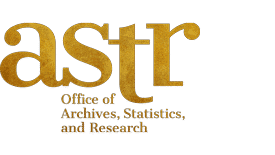The eye cannot say to the hand, “I have no need of you,” nor again the head to the feet, “I have no need of you.” On the contrary, the parts of the body that seem to be weaker are indispensable, and on those parts of the body that we think less honorable we bestow the greater honor, and our unpresentable parts are treated with greater modesty, which our more presentable parts do not require. But God has so composed the body, giving greater honor to the part that lacked it, that there may be no division in the body, but that the members may have the same care for one another. If one member suffers, all suffer together; if one member is honored, all rejoice together. (1 Corinthians 12:21–26, ESV)
In 1 Corinthians 12, we are reminded of the way that we, as Christians, should interact and rely upon each other. Each member must do his or her part so that the “body,” as a whole, can thrive. What does this look like, though, when a member has a disability of some sort?
As a reminder, the 2017–2018 Global Church Member Survey (2017–18 GCMS) determined that, of the 60,040 respondents worldwide who answered that question,
- 1.3% were Deaf,
- 2.5% had another hearing-related disability.
- 2.2% had a mobility disability,
- 5.8% had a visual disability,
- 1.7% had a cognitive disability,
- 1.3% had a speech or speaking disability, and
- 2.8% reported having another type of disability (i.e., “other”).
When the 2017–18 GCMS data of those with a disability were compared to those having no disability, members that reported to have a disability helped with a church ministry on Sabbath nearly as often as those with no disability:
- 11% of those with a disability reported that they helped with church ministry on Sabbath once a month (compared to 10% of those without a disability)
- 14% of those with a disability shared that they helped almost every week (compared to 15% of those without a disability)
- 32% of those with a disability stated that they helped every week or more often (compared to 36% of those without a disability)
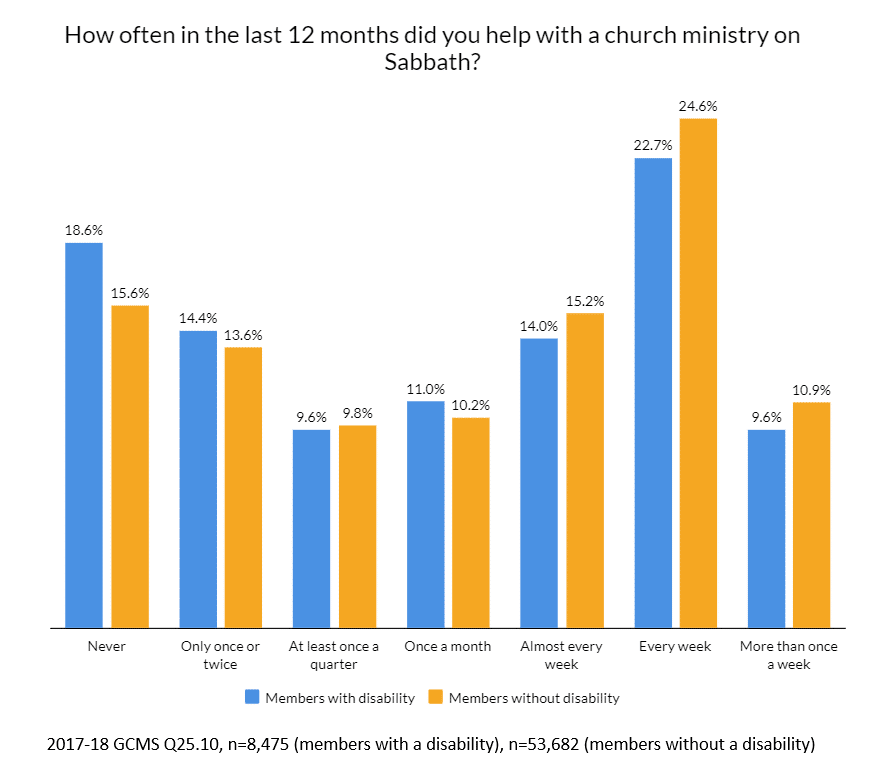
It should be noted that nearly one in five (19%) of the respondents who reported having a disability of any kind shared that they were never involved in church ministry on Sabbath. However, the number of involved individuals, as well as the correlating number of people without a disability who are never involved (16%) with church ministry on Sabbath, seems to indicate that perhaps having a disability does not present as big a barrier to ministry as many might presume.
The 2017–18 GCMS results also showed that similar numbers of members with and without a disability are involved with a church ministry during the week:
- 10% of both those with a disability and those without helped with a church ministry during the week once a month
- 11% of those with a disability reported that they helped almost every week (as compared to 12% of those without a disability)
- 27% of those with a disability stated that they helped every week or more often (as compared to 28% of those without a disability)
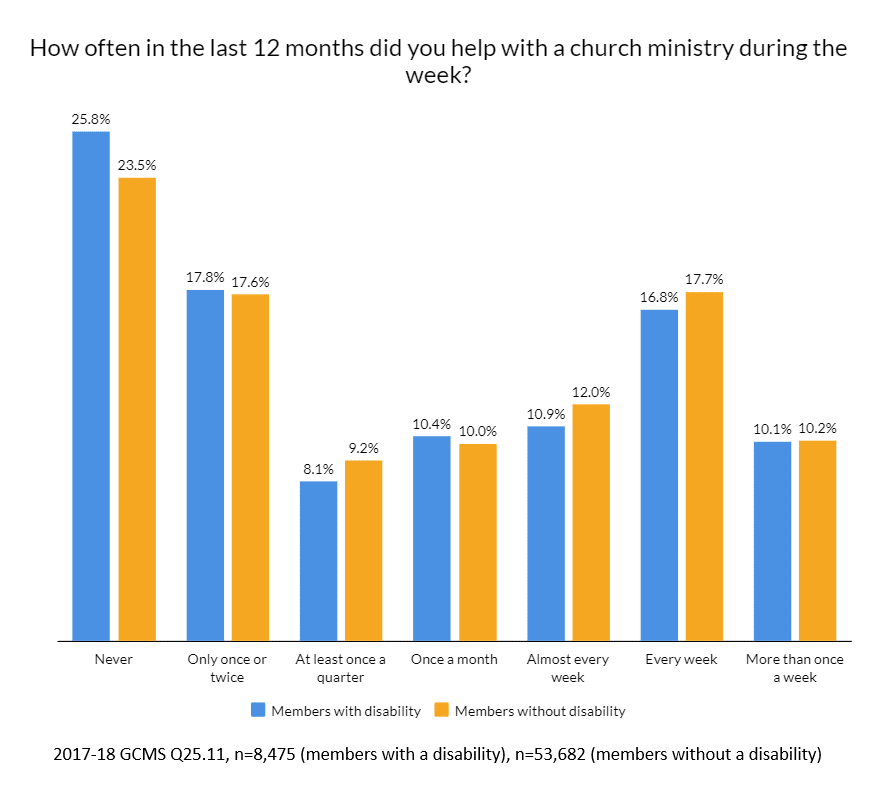
The 2017–18 GCMS data also showed the following:
- Members with a disability (61%) were just as likely as those without (61%) to attend a small group organized by their church once a month or more often.
- Between 19 and 20% in both groups had never attended a small group meeting in the previous year.
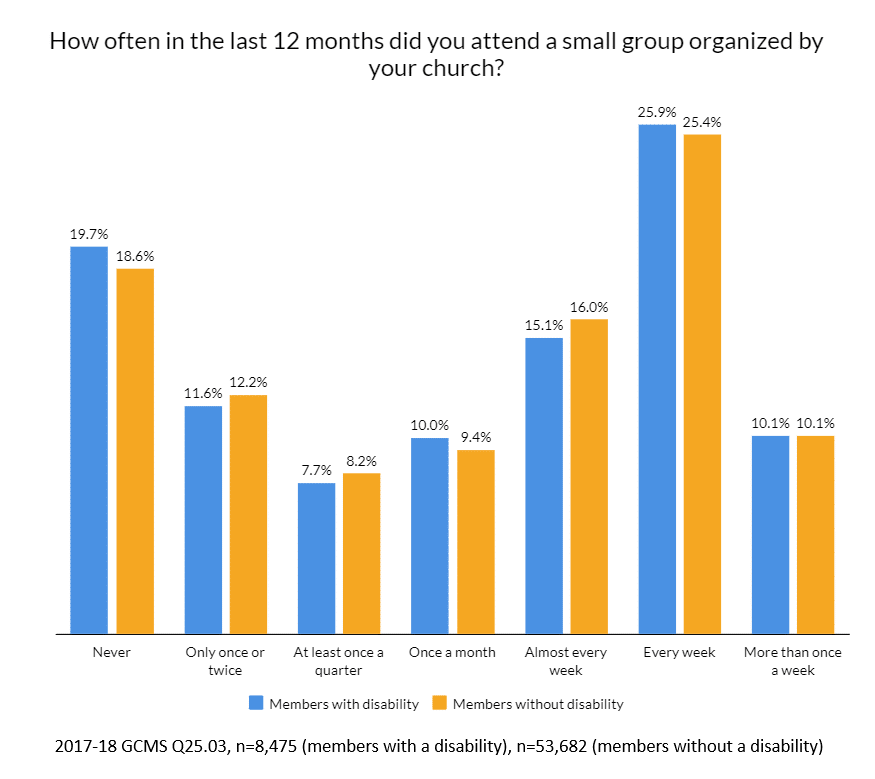
- Members with a disability (64%) were slightly more likely than those without (63%) to attend a prayer meeting at their church once a month or more often.
- It is encouraging that 40% of those with a disability said they had attended a church prayer meeting every week or more often during the previous 12 months. It is slightly more than those in the group without any disability who did so.
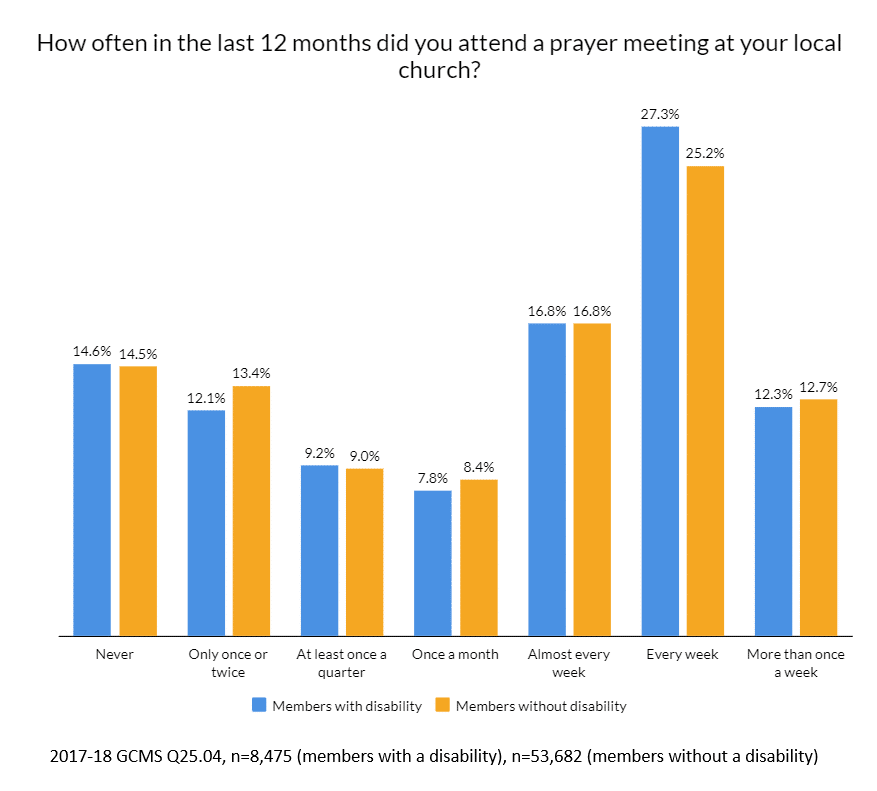
This data makes it clear that church members with a disability find value in being involved in church ministry and attending church programs. They desire to be valued as parts of the Body of Christ and want to be involved—just like those without a disability. However, the church should not overlook that about a third of those with a disability had never helped or had helped just once or twice with a church ministry on Sabbath in the previous year. Even more (44%) had never helped or had helped just once or twice with a church ministry during the week. Slightly more than a quarter had not attended prayer meetings more than twice if ever, and almost a third of them (31%) had also not attended a small group at all or had not attended more than once or twice. How can a local church help those with a disability or without it feel needed and be included in church programs? What are some ways your church employs to mobilize all members of Christ’s Body in service for Him? We hope and pray that the Adventist Church can be a safe, inclusive environment where all members are appreciated and can find a place to be involved.
You can find further information about those with disabilities in this blog.
For more research findings on the total sample please see the Meta-Analysis report.
Created in collaboration with the Institute of Church Ministry
Published by ASTR on 01-26-2022
